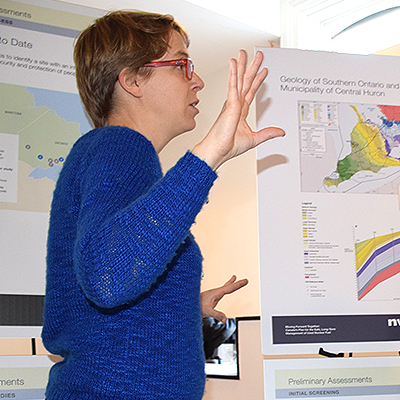The Nuclear Waste Management Organization (NWMO) has completed the first phase of preliminary assessment for the Municipality of Central Huron, Ontario.
Based on work the NWMO completed, Central Huron is assessed as having potential to meet site selection requirements for a deep geological repository for used nuclear fuel, and warrants further study.
“The objective of the site selection process is to arrive at a single location for a deep geological repository and a Centre of Expertise with a willing and informed host,” said Kathryn Shaver, Vice-President of APM Engagement and Site Selection at the NWMO. “Increasingly detailed field studies and engagement, completed in collaboration with the community, will provide additional learning about the area’s potential for meeting strict safety requirements and for the project to align with the community’s long-term vision.”
The community requested a preliminary assessment after expressing interest in learning about Canada’s plan for the safe, long-term care of used nuclear fuel. Preliminary findings do not confirm technical suitability and safety of any site, and at this early point in the process no community is asked to confirm its willingness to host the project. Nor do these findings affect work ongoing in eight other areas in Ontario involved in the site selection process.
The NWMO has completed Phase 1 preliminary assessments in 21 communities that requested them, including Central Huron. Nine Ontario communities are continuing to learn more about Canada's plan. It is expected to take several more years to complete the necessary studies to identify a preferred site in an area with an informed and willing host.
Recognizing Community Leadership
Central Huron is also being recognized at this milestone in the process for its leadership in advancing Canada’s plan. The NWMO will provide $400,000 to the municipality upon the establishment of a Community Well-Being Reserve Fund. Other communities were similarly recognized upon completion of their Phase 1 studies.
“Each community that has reached this stage of the process has helped ensure that discussion and learning continues, and that important questions about safety are asked,” said Ms. Shaver. “Central Huron has played an important role in in advancing this major national project on behalf of Canadians.”
Administered by the community, these funds support continuing efforts to build community sustainability and well-being. Examples of activities the fund could support include projects, programs or services that benefit community youth or seniors, community sustainability, energy efficiency, or economic development initiatives.
Background and Next Steps
Preliminary assessments are the third of nine steps in a multi-year process for evaluating potential suitability of communities to host a deep geological repository for Canada’s used nuclear fuel and an associated Centre of Expertise. The first phase evaluates in a preliminary way the potential for an area to meet or exceed strict technical requirements, and for the project to align with the community’s long-term goals and vision.
For communities that continue, the next phase of work involves more intensive community learning and engagement. Work will take on a broader focus to include First Nation and Métis communities in the area as well as neighboring municipalities.
Preliminary fieldwork will also begin, including activities such as geological surveys and limited borehole drilling, to further assess geology and site suitability against technical safety requirements. The NWMO will develop scope, location, and timing of field studies in collaboration with the community.
As individual studies are completed, the NWMO will continue to narrow its focus to areas with strong potential to be suitable for hosting a repository. Ultimately, the project will only proceed at a site that can safely contain and isolate used nuclear fuel, and with the involvement of the interested community, First Nation and Métis communities in the area and surrounding municipalities.
It is expected to take several more years to complete the necessary studies to identify a preferred site and an informed and willing host. Communities may choose to end their involvement at any point during the site selection process, until a final agreement is signed, subject to all regulatory requirements being met and approvals received.
-30-

